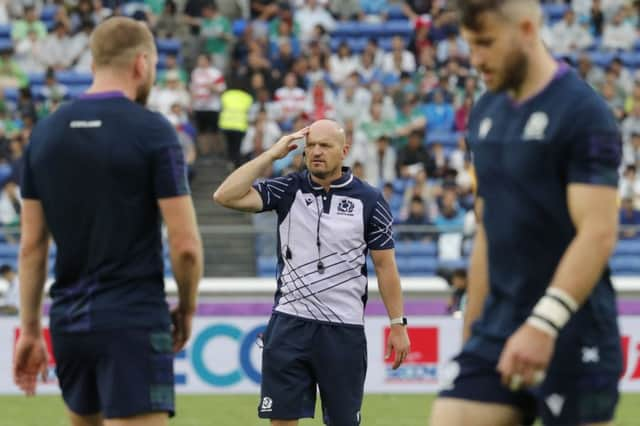Allan Massie: Scotland’s tactics seemed fine, the problem was the execution


It couldn’t have been more disappointing. Ireland may have been flattered by their No 1 world ranking, but they played as if they deserved to be in that position. They won very comfortably while doing little that was creative.
Their forwards were aggressive at the turnover and Conor Murray kept them on the front foot.
Advertisement
Hide AdAdvertisement
Hide AdIn truth we had plenty of ball, but it was often slow and Ireland’s rush defence quickly closed us down, helped on more than one occasion by Wayne Barnes’ indifferent policing of the offside line. Consequently both Finn Russell and Stuart Hogg tried to put the ball into space behind the Irish defence, but neither kicked very well.
Too often their kicks surrendered possession and Ireland in possession were always secure.
Ireland seemed scarcely to miss a tackle. Scotland missed too many. Stuart McInally will be embarrassed by his failure even to check the run from Iain Henderson which led to the first Irish try, let alone not putting him on the floor.
All three first-half tries were scored when Ireland got within five metres of our line, and when they got there, you all but knew a try would be scored.
But each time it was a Scottish mistake which let them get that close – a missed tackle, a penalty conceded, and then a wild Scottish pass that didn’t go to hand and was hacked up the field with Hogg being forced back over the line to touch down and concede a five-metre scrum.
Being 3-19 down at half-time didn’t mean the game was lost. With seven points for a converted try, a match can turn quickly, as Argentina showed against France on Saturday.
There would have been memories of the Calcutta Cup in the dressing-room and among fans.
Doubtless the rain beginning to fall heavily didn’t help, but we dominated the second half territorially without, to be honest, ever looking like scoring.
Advertisement
Hide AdAdvertisement
Hide AdSomething always went wrong, John Barclay for instance running a good line on to a half-break only, uncharacteristically, to knock the ball on.
When good players like Barclay and Duncan Taylor fail to gather good passes, you know it’s not your day.
Then Ireland’s only second-half score came from Scottish mistakes, first Ryan Wilson dropping a kick and then Ireland’s Andrew Conway being gifted an undefended blind side.
Losing Hamish Watson just before half-time to a dubiously lawful shoulder-charge take-out at a ruck probably made no difference to this game; sadly if his injury is as bad as it looked, it may to subsequent ones.
All the same, Watson hadn’t been able to impose himself on the game as he often does.
Few of the Scots emerged with credit. Finn Russell kept trying to make things happen but nothing quite came off. Sam Johnson made a couple of fine tackles but had little chance to show his attacking abilities.
Hogg made a few half-breaks but was tackled in possession when he might have passed. Sean Maitland gave glimpses of his attacking ability but no more than glimpses.
Tommy Seymour and Duncan Taylor were both off the pace or out of sorts. Greig Laidlaw did nothing wrong but couldn’t exercise control. Ali Price added speed and energy when he came on, perhaps too late, as did Darcy Graham.
Advertisement
Hide AdAdvertisement
Hide AdUp front, the set scrum and line-out were all right without being dominating. There was little of the fire in the loose one would have liked to see; Johnny Gray, as usual, carried manfully without ever threatening to break through.
Young Scott Cummings might, like Price and Graham, have been introduced earlier, though in truth the match was well gone by the hour mark and any scores afterwards would merely have made the final result look a little better.
Well, we’ve a full week to lick our wounds and think about it before we meet Samoa. We can take some encouragement from the knowledge that we have lost pool games before now and still reached the quarter-finals.
In 2015 Vern Cotter’s team were thumped 34-16 by South Africa and then struggled to beat Samoa 36-33 in a match in which they scored five tries to our three, and we had to thank Laidlaw’s five penalty goals for our victory.
That memory and Scotland’s performance yesterday will surely mean that Samoa enter the coming match not short of confidence.
No doubt social media will already be awash with criticism of Gregor Townsend, but there seemed nothing wrong with our tactics. It was the execution that was at fault. Too much attention is given to coaches.
It’s players, not coaches, who miss tackles or drop passes. Nor was there much advance criticism of the selection.
One may in retrospect say it might have been different and better, but yesterday’s failure was more collective than individual.
Advertisement
Hide AdAdvertisement
Hide AdOut of interest I’ve just looked up Tom English’s report of that 2015 Samoa game.
Scotland were in the first half “an unmitigated shambles, incredibly slow at re-starts, passive in the tackle, hugely vulnerable out wide and beaten in all parts of the pitch”.
Yet a week later we came within minutes of beating Australia in the quarter-final. Things in sport can turn round very quickly.